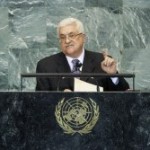The Palestinians are warning they will not continue preparatory discussions with the Israelis seeking to restart peace talks unless Israel addresses the topic of borders to their satisfaction. The Israelis have said in the past they don’t want the borders issue to be in a vacuum separated from the other points in the conflict, especially since the borders area is one where Israel is expected to make some of its most painful compromises.
The Palestinian Ma’an News Agency reported that Palestinian Authority (PA) officials said President Mahmoud Abbas “refused and will continue to refuse” to maintain the meetings with Israel being held under Jordanian auspices. Negotiators from the sides during January have been seeking for a path back to direct peace talks, the first face-to-face meetings since the Palestinians suspended negotiations more than a year ago.
But after four such meetings, the Palestinians are saying that the next meeting on Wednesday will be the last unless Israel discusses the borders issue in this preliminary stage, prior to the resumption of formal negotiations. Borders are one of a series of “core issues” between the sides, along with the status of Jerusalem, the use of water resources, security, settlements and other matters.
Back at the beginning of the Jordan-held meetings, Israeli Prime Minister’s Office spokesman Mark Regev told The Mideast Update on January 2, “Israel has been ready for discussion of all the core issues to the conflict. We think that’s the only way to try to narrow the gaps,” said Regev.
“One of the problems has been up until now is that the Palestinians have said, ‘We only want to discuss one of the core issues, the issue of borders,’ where the presumption is that’s the issue where Israel has to show flexibility.”
He said at the time that Israel is willing to show flexibility, but “we want to have a situation where there is a real negotiation, where there are tradeoffs between the different issues and we’re ready for that sort of comprehensive discussion.”
The Mideast Quartet, consisting of the European Union, the United States, Russia and the United Nations, has been trying to get the sides back to direct negotiations, including a proposal made in September that seeks a deal by the end of this year.
(By Joshua Spurlock, www.themideastupdate.com, January 25, 2012)

